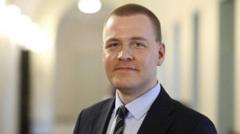As the world grapples with the loss of Pope Francis, aged 88, many mourners gather in St. Peter’s Square to pay tribute to a leader who championed the poor and marginalized throughout his 12-year papacy.
Pope Francis is Remembered as a Champion of the Marginalized Following His Passing

Pope Francis is Remembered as a Champion of the Marginalized Following His Passing
A Global Mourning: tributes to the late Pope Francis reflect his deep commitment to the disenfranchised.
April 21, 2025, 2:01 PM ET
Pope Francis passed away at the age of 88, leading many around the world to reflect on his significant legacy as a leader who consistently advocated for the poor and the marginalized. His recent death came just a day after he delighted crowds on Easter Sunday from his wheelchair, ushering in a deep sense of loss among his followers. Global leaders have come forth to commend Francis for his pivotal contributions to social justice and humanitarian causes, capturing the hearts of over a billion Catholics across the globe.
The Vatican announced the news of his death in a solemn early morning statement, marking the end of a pontificate defined by an unwavering commitment to inclusivity and social equity. Mourners, appearing in shock, flocked to St. Peter’s Square, where they remembered his touching moments with the community. Many expressed disbelief, sharing stories of his unexpected appearance the day prior.
“We were all waiting for healing, and now this tragedy has struck,” Marco Volpi, a devout follower, stated. The void left by Francis’ death has prompted discussions about his successor and whether the new pope will continue his legacy of welcome toward the disenfranchised or revert to a more traditional, doctrinaire approach.
Francis’ papacy was marked by a series of groundbreaking initiatives that focused on inclusion, with memorable stances on climate change, migration, and the reconciliation of injustices towards indigenous peoples. He faced significant challenges but maintained advocacy for key social issues throughout his life. His call for a church that reaches the margins of society resonated widely, prompting both admiration and criticism from various sectors.
As tributes pour in globally, leaders spanning multiple faiths and political backgrounds have expressed admiration for the compassionate legacy Francis leaves behind. However, his absence leaves a crucial question for the coming days: who will emerge as the next pope, and what direction will the Roman Catholic Church take in this evolving landscape of faith and social justice?
Reflecting on his health, attended to closely since a severe bout with pneumonia, Francis’ recent appearances were emblematic of his tenacity and dedication. While a funeral date has yet to be confirmed, church officials have suggested a public viewing could commence as early as Wednesday, allowing faithful followers to pay their respects to their beloved pontiff.
The road ahead remains uncertain for the Catholic Church, with the stakes as high as ever. Will the church continue to engage with the world as Francis envisioned, or will it take a step back into tradition? For many, the answer lies in the heart of the forthcoming conclave and the choices they will face.
Pope Francis passed away at the age of 88, leading many around the world to reflect on his significant legacy as a leader who consistently advocated for the poor and the marginalized. His recent death came just a day after he delighted crowds on Easter Sunday from his wheelchair, ushering in a deep sense of loss among his followers. Global leaders have come forth to commend Francis for his pivotal contributions to social justice and humanitarian causes, capturing the hearts of over a billion Catholics across the globe.
The Vatican announced the news of his death in a solemn early morning statement, marking the end of a pontificate defined by an unwavering commitment to inclusivity and social equity. Mourners, appearing in shock, flocked to St. Peter’s Square, where they remembered his touching moments with the community. Many expressed disbelief, sharing stories of his unexpected appearance the day prior.
“We were all waiting for healing, and now this tragedy has struck,” Marco Volpi, a devout follower, stated. The void left by Francis’ death has prompted discussions about his successor and whether the new pope will continue his legacy of welcome toward the disenfranchised or revert to a more traditional, doctrinaire approach.
Francis’ papacy was marked by a series of groundbreaking initiatives that focused on inclusion, with memorable stances on climate change, migration, and the reconciliation of injustices towards indigenous peoples. He faced significant challenges but maintained advocacy for key social issues throughout his life. His call for a church that reaches the margins of society resonated widely, prompting both admiration and criticism from various sectors.
As tributes pour in globally, leaders spanning multiple faiths and political backgrounds have expressed admiration for the compassionate legacy Francis leaves behind. However, his absence leaves a crucial question for the coming days: who will emerge as the next pope, and what direction will the Roman Catholic Church take in this evolving landscape of faith and social justice?
Reflecting on his health, attended to closely since a severe bout with pneumonia, Francis’ recent appearances were emblematic of his tenacity and dedication. While a funeral date has yet to be confirmed, church officials have suggested a public viewing could commence as early as Wednesday, allowing faithful followers to pay their respects to their beloved pontiff.
The road ahead remains uncertain for the Catholic Church, with the stakes as high as ever. Will the church continue to engage with the world as Francis envisioned, or will it take a step back into tradition? For many, the answer lies in the heart of the forthcoming conclave and the choices they will face.



















